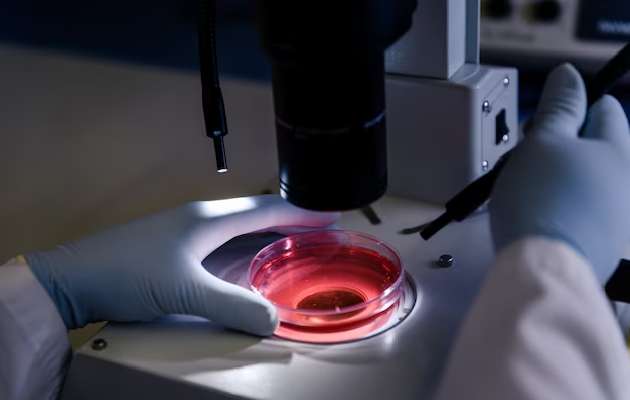


Microbiology Tests at Biocheck Diagnostics And Polyclinic help detect bacterial, viral, fungal, and parasitic infections. These tests, including Urine Culture, Blood Culture, Gene Expert for TB, PAP Smear, and Herpes Virus Testing, provide essential insights into infectious diseases.
By identifying the causative pathogens and determining treatment options, microbiology tests play a crucial role in disease prevention and management.
Microbiology Test
A Microbiology tests play a crucial role in diagnosing infections caused by bacteria, viruses, fungi, and parasites. These tests help identify pathogens, determine antibiotic susceptibility, and guide appropriate treatment plans.
Microbiology tests are performed on various body fluids, tissues, and excretions, such as blood, urine, stool, and pus, to detect infections that could lead to serious health complications.
By analyzing samples at a microscopic level, microbiology tests help detect bacterial, viral, and fungal infections and monitor disease progression. They are essential for identifying contagious diseases, understanding resistance patterns, and ensuring effective treatment.
Microbiology Test

Proper preparation for microbiology tests ensures accurate and reliable results. Here are some key guidelines:
Consult your doctor for specific instructions based on the type of microbiology test you require.
WHY CHOOSE Biocheck Diagnostics And Polyclinic
Our laboratory is led by a highly qualified M.D. Pathologist, ensuring that every test is interpreted with expert knowledge.
We use advanced technology and automated systems to ensure that your Microbiology test results are accurate, reliable, and fast.
Our lab is staffed with highly trained and experienced hematologists and medical technologists who interpret and analyze your results with precision.
We prioritize your privacy. All test results are confidential and shared only with you and your healthcare provider.
At the heart of everything we do is our commitment to the patient.
We understand that healthcare costs can be a concern, which is why we offer affordable pricing for all of our Microbiology tests.
What Biocheck Offers
Detects bacteria causing urinary tract infections (UTIs) and determines suitable antibiotics.
Identifies bacterial causes of diarrhea and gastrointestinal infections.
Determines bacterial or fungal infections in wounds or abscesses.
Identifies bacteria or fungi in the bloodstream to diagnose septicemia.
Analyzes infections in pleural, cerebrospinal, and joint fluids.
KNOW ABOUT MICROBIOLOGY
Microbiology diseases and disorders are caused by various microorganisms, including bacteria, viruses, fungi, and parasites. These infections can affect different body systems, leading to a wide range of health issues. Understanding these diseases helps in early diagnosis, proper treatment, and prevention.
Bacterial infections occur when harmful bacteria enter the body and multiply, leading to illness. Some of the most common bacterial infections include urinary tract infections (UTIs), which are detected through urine culture & sensitivity tests and often caused by Escherichia coli (E. coli). Gastrointestinal infections, such as food poisoning and diarrhea, can result from bacteria like Salmonella, Shigella, and Clostridium difficile and are diagnosed through stool culture & sensitivity tests. Bloodstream infections (sepsis) are severe bacterial infections that can spread throughout the body, requiring blood culture & sensitivity tests for detection. Other bacterial infections include pneumonia, tuberculosis (TB), wound infections, and meningitis, all of which can be identified using microbiological testing.
Viruses are microscopic organisms that invade living cells to replicate and cause disease. Some common viral infections include influenza (flu), hepatitis, HIV/AIDS, herpes simplex virus (HSV), and respiratory infections such as COVID-19. The Herpes Virus Test detects herpes simplex infections, while Gene Expert and Mantoux Test help diagnose tuberculosis (TB), a bacterial infection with a viral-like transmission pattern. Viral infections often spread through direct contact, respiratory droplets, or contaminated surfaces, and microbiology tests are essential for accurate diagnosis and management.
Fungal infections are caused by fungi that grow on the skin, mucous membranes, and internal organs. Common fungal infections include candidiasis (yeast infections), aspergillosis, ringworm, and histoplasmosis. These infections can affect the skin, nails, lungs, and even the bloodstream in immunocompromised individuals. Pus Culture & Sensitivity and Gram Stain tests help detect fungal infections in wounds or tissue samples, while fluid culture tests identify fungal growth in body fluids. Some fungal infections, like cryptococcal meningitis, can be life-threatening if not diagnosed early.
Parasitic infections result from organisms such as protozoa, helminths (worms), and ectoparasites (lice, mites). Common parasitic diseases include malaria, giardiasis, toxoplasmosis, and amoebiasis. These infections often spread through contaminated food, water, or insect bites. Stool analysis and stool culture tests help diagnose intestinal parasites, while blood smears and molecular tests identify parasites like Plasmodium (which causes malaria). Parasitic infections can lead to digestive problems, neurological issues, and anemia if left untreated.
Tuberculosis is a severe bacterial infection caused by Mycobacterium tuberculosis, affecting the lungs and sometimes spreading to other organs. The Mantoux Test and Gene Expert TB test help diagnose TB by detecting bacterial presence or resistance. Other respiratory infections, including pneumonia, bronchitis, and COVID-19, are caused by various bacteria and viruses and are diagnosed using microbiology tests such as blood culture, sputum analysis, and PCR-based testing.
STIs are infections primarily transmitted through sexual contact. Common STIs include syphilis, gonorrhea, chlamydia, HIV/AIDS, hepatitis B and C, and herpes simplex virus (HSV). These infections can cause long-term complications such as infertility, chronic pain, and increased risk of other infections. Microbiology tests such as PAP Smear, blood tests, and viral marker screenings help diagnose these conditions and guide appropriate treatment.
Gastrointestinal infections occur due to bacteria, viruses, or parasites affecting the stomach and intestines. Common causes include Salmonella, Helicobacter pylori, E. coli, norovirus, and rotavirus. These infections result in symptoms like diarrhea, vomiting, abdominal cramps, and dehydration. Stool culture & sensitivity tests and fluid culture tests are essential for diagnosing these infections and determining the appropriate treatment.
Certain microorganisms can infect the nervous system, leading to severe conditions such as meningitis, encephalitis, and brain abscesses. Bacterial meningitis, caused by Streptococcus pneumoniae or Neisseria meningitidis, is life-threatening and requires immediate diagnosis via blood culture, cerebrospinal fluid analysis, and Gram staining. Viral encephalitis, caused by viruses like herpes simplex virus (HSV) or enteroviruses, can lead to brain inflammation and neurological damage if untreated.
Microbiology tests play a crucial role in detecting and controlling infectious diseases. By identifying specific pathogens and their resistance patterns, these tests help healthcare providers prescribe effective treatments. Tests such as culture & sensitivity, molecular diagnostics, Gram staining, and PCR-based tests are vital tools in infection prevention and control.
Microbiology diseases and disorders encompass a wide range of infections affecting different organ systems. Early and accurate diagnosis through microbiology tests ensures proper treatment, reducing the risk of complications and transmission.
Microbiology tests are essential diagnostic tools used to identify and analyze microorganisms such as bacteria, viruses, fungi, and parasites that cause infections in the human body. These tests help healthcare professionals determine the exact cause of an illness, guide appropriate treatment, and monitor disease progression. The tests involve collecting samples from body fluids, tissues, or excretions and analyzing them using various laboratory techniques. Below are some of the key microbiology tests performed at diagnostic centers.
Urine culture and sensitivity testing are performed to detect bacterial infections in the urinary tract. This test helps diagnose urinary tract infections (UTIs) and determine the most effective antibiotics for treatment. A urine sample is cultured in a lab, and if bacteria are present, further testing identifies the type of bacteria and its antibiotic sensitivity.
Stool culture and sensitivity tests are used to detect bacterial infections in the digestive system. Common pathogens such as Salmonella, Shigella, Clostridium difficile, and Escherichia coli (E. coli) can cause gastrointestinal infections leading to symptoms like diarrhea, vomiting, and abdominal pain. This test helps identify the bacteria responsible for the infection and determines the best treatment approach.
Pus culture and sensitivity testing is used to identify bacterial or fungal infections in wounds, abscesses, or surgical sites. The test helps detect the presence of harmful microorganisms causing skin or tissue infections, such as Staphylococcus aureus or Pseudomonas aeruginosa. Sensitivity testing further determines the most effective antibiotics for treatment.
A conjunctival smear test is used to detect bacterial, viral, or fungal infections in the eyes. It helps diagnose conditions such as conjunctivitis (pink eye), keratitis, and other ocular infections. A sample is collected from the conjunctiva and examined under a microscope or cultured to identify the infectious agent.
Blood culture tests are performed to detect bacterial or fungal infections in the bloodstream, a condition known as sepsis. This test is crucial for identifying life-threatening infections, including those caused by Staphylococcus aureus, Streptococcus pneumoniae, Klebsiella pneumoniae, and Escherichia coli. The test helps determine the right antibiotics to treat bloodstream infections effectively.
Fluid culture tests help detect infections in body fluids such as cerebrospinal fluid (CSF), pleural fluid, peritoneal fluid, and synovial fluid. These tests are essential for diagnosing conditions like meningitis, peritonitis, and joint infections. Identifying the microorganism responsible for the infection allows doctors to administer targeted treatments.
The Gene Expert test is a molecular diagnostic test used to detect tuberculosis (TB) and drug-resistant TB. It uses polymerase chain reaction (PCR) technology to identify the DNA of Mycobacterium tuberculosis in sputum or other body fluids. This test provides rapid and accurate TB diagnosis, especially in cases of multidrug-resistant TB (MDR-TB).
The Mantoux test, also known as the tuberculin skin test (TST), is used to screen for tuberculosis (TB) infection. A small amount of purified protein derivative (PPD) is injected into the skin, and the reaction is observed after 48-72 hours. A raised, hard area at the injection site may indicate TB infection, requiring further diagnostic testing.
The Endometrium TB - Mycoreal test is used to detect tuberculosis infections in the female reproductive system, particularly the uterus. This test is essential for diagnosing genital TB, a condition that can lead to infertility and other reproductive health issues. It uses molecular techniques to identify the presence of Mycobacterium tuberculosis in endometrial tissue samples.
A PAP smear, or Papanicolaou test, is a screening procedure for detecting cervical cancer and human papillomavirus (HPV) infections. The test involves collecting cells from the cervix and examining them under a microscope to identify any abnormal or pre-cancerous changes. Regular PAP smears help in early detection and prevention of cervical cancer.
The Gram stain test is a laboratory technique used to classify bacteria into two categories: Gram-positive and Gram-negative. This test is essential for diagnosing bacterial infections, as it helps determine the type of bacteria present and guides the choice of appropriate antibiotics. It is commonly used for analyzing pus, urine, sputum, and blood samples.
The herpes virus test is used to detect herpes simplex virus (HSV) infections, which cause cold sores, genital herpes, and other viral infections. This test identifies HSV-1 and HSV-2 using blood samples, swabs from sores, or cerebrospinal fluid in cases of severe infection. Early diagnosis allows for effective management and treatment of herpes infections.
Microbiology tests play a crucial role in diagnosing a wide range of infections caused by bacteria, viruses, fungi, and parasites. These tests help healthcare professionals identify the root cause of infections, determine effective treatments, and prevent complications. With advancements in laboratory techniques, microbiology testing continues to improve disease detection, guiding timely and accurate medical interventions.
MAKE APPOINTMENTS